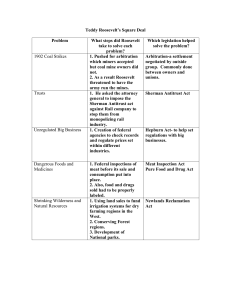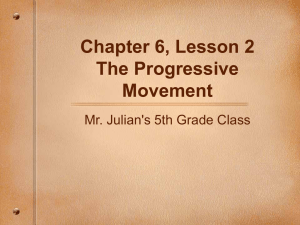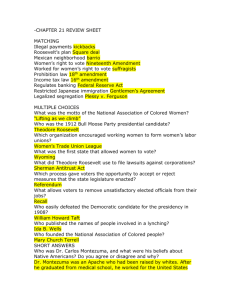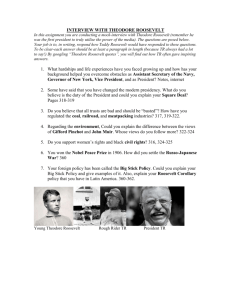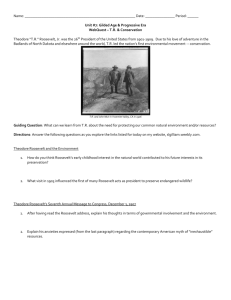Source 2
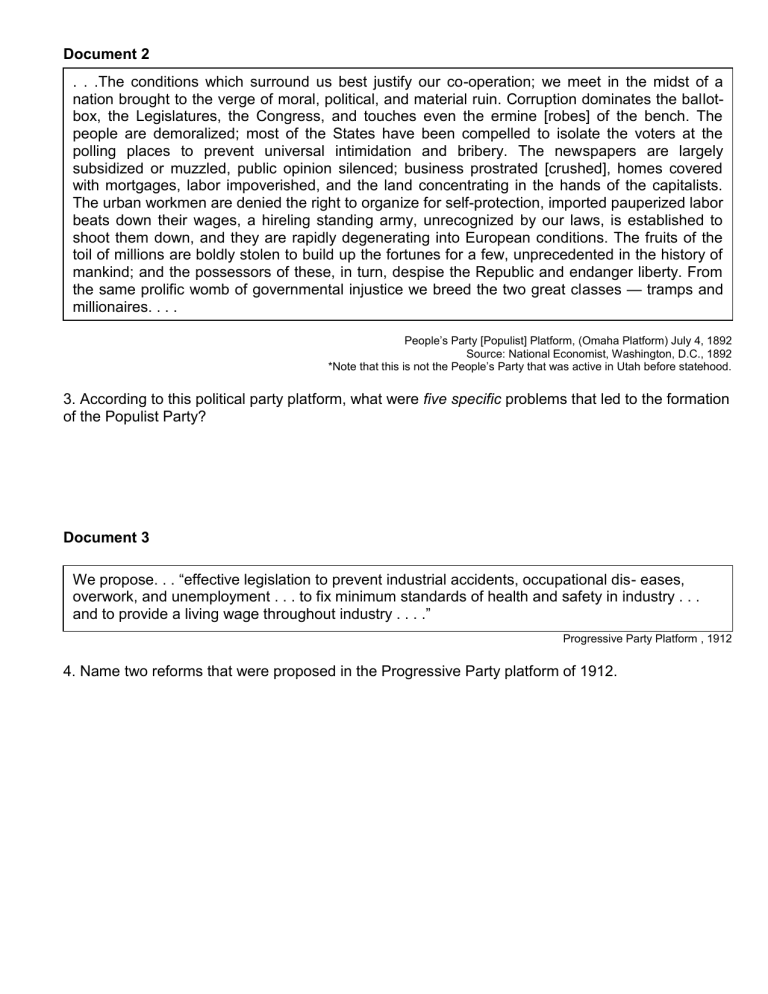
Document 2
. . .The conditions which surround us best justify our co-operation; we meet in the midst of a nation brought to the verge of moral, political, and material ruin. Corruption dominates the ballotbox, the Legislatures, the Congress, and touches even the ermine [robes] of the bench. The people are demoralized; most of the States have been compelled to isolate the voters at the polling places to prevent universal intimidation and bribery. The newspapers are largely subsidized or muzzled, public opinion silenced; business prostrated [crushed], homes covered with mortgages, labor impoverished, and the land concentrating in the hands of the capitalists.
The urban workmen are denied the right to organize for self-protection, imported pauperized labor beats down their wages, a hireling standing army, unrecognized by our laws, is established to shoot them down, and they are rapidly degenerating into European conditions. The fruits of the toil of millions are boldly stolen to build up the fortunes for a few, unprecedented in the history of mankind; and the possessors of these, in turn, despise the Republic and endanger liberty. From the same prolific womb of governmental injustice we breed the two great classes — tramps and millionaires. . . .
People’s Party [Populist] Platform, (Omaha Platform)
July 4, 1892
Source: National Economist, Washington, D.C., 1892
*Note that this is not the People’s Party that was active in Utah before statehood.
3. According to this political party platform, what were five specific problems that led to the formation of the Populist Party?
Document 3
We propose. . . “effective legislation to prevent industrial accidents, occupational dis- eases, overwork, and unemployment . . . to fix minimum standards of health and safety in industry . . . a nd to provide a living wage throughout industry . . . .”
Progressive Party Platform , 1912
4. Name two reforms that were proposed in the Progressive Party platform of 1912.
Document 4a
. . . It is ten years and over, now, since that line
[between rich and poor] divided New York’s population evenly. To-day three-fourths of its people live in the tenements, and the nineteenth century drift of the population to the cities is sending ever increasing multitudes to crowd them. The fifteen thousand tenant houses that were the despair of the sanitarian in the past generation have swelled into thirty-seven thousand, and more than twelve hundred thousand persons call them home.
The one way out he saw —rapid transit to the suburbs —has brought no relief. We know now that there is no way out; that the “system” that was the evil offspring of public neglect and private greed has come to stay, a storm-centre forever of our civilization. Nothing is left but to make the best of a bad bargain. . . .
Source: Jacob Riis, How the
Other Half Lives, Charles
Scribner’s Sons, 1890
5. Based on these documents, state three problems faced by cities in the United States in the late 1800s.
Document 4b
Photo by Jacob Riis, 1890
Document 4c
Document 5
In this Frank Beard cartoon, a saloon owner is wrapped in the protection of the law from the accusations of Themis, the Greek goddess of justice.
6. According to Frank Beard, what were four reasons people supported the temperance movement?
Document 6
. . . the manufacture, sale, or transportation of intoxicating liquors within, the importation thereof into, or the exportation thereof from the United States and all territory subject to the jurisdiction thereof for beverage purposes is hereby prohibited.
Source: United States Constitution, 18th Amendment, Section 1, 1919
7. Based on this document, state two ways reformers tried to prohibit and stop intoxicating liquors from being available in the United States.
Document 7
PREFACE
Salary — A periodical [regular] allowance made as compensation to a person for his official or professional services or for his regular work. –Funk and Wagnalls.
Notice the words, “a person.” Here is no differentiation between male persons and female persons. Yet the City of New York pays a “male” person for certain “professional services” $900, while paying a “female” person only $600 for the same “professional services.” Stranger still, it pays for certain experience of a “male” person $105, while paying a “female” person only $40 for the identical experience. These are but samples of the “glaring inequalities” in the teachers’ salary schedules. . . .
Source: Grace C. Strachan, Equal Pay for Equal Work, B. F. Buck & Company, 1910
8. What are three problems addressed by Grace C. Strachan?
Document 8
. . . Women compose one-half of the human race. In the last forty years, women in gradually increasing numbers have been compelled to leave the home and enter the factory and workshop.
Over seven million women are so employed and the remainder of the sex are employed largely in domestic services. A full half of the work of the world is done by women. A careful study of the matter has demonstrated the vital fact that these working women receive a smaller wage for equal work than men do and that the smaller wage and harder conditions imposed on the woman worker are due to the lack of the ballot. . . .
The great doctrine of the American Republic that “ all governments derive their just powers from the consent of the governed
,” justifies the plea of one-half of the people, the women, to exercise the suffrage. The doctrine of the American Revolutionary War that taxation without representation is unendurable [intolerable], justifies women in exercising the suffrage. One great advantage, however, of the suffrage is in raising women to a position of greater honor and dignity so that the children of the land shall show and feel greater reverence and honor for their mothers, and that the mothers may teach the elementary principles of good government while they are teaching them good manners, morality and religion. . . .
Source: Senator Robert Owen, Speech, 1910
9. Based on this document, state three reasons for giving women the right to vote.
Document 9
The preamble of the Federal Constitution says: “We, the people of the United States...” It was we, the people; not we, the white male citizens; nor yet we, the male citizens; but we, the whole people, who formed the Union. And we formed it, not to give the blessings of liberty, but to secure them; not to the half of ourselves and the half of our posterity, but to the whole people-women as well as men.
Susan B. Anthony
10. What argument was used by Susan B. Anthony to support the demand that women be given the right to vote?
Document 10
11. Based on the information on this poster, why is child labor considered a national problem?
Document 11
First factory Law of Illinois
FACTORIES AND WORKSHOPS
. . . 4. Children under 14 years of age prohibited from being employed in any manufacturing establishment, factory or work shop in the state. Register of children under 16 years shall be kept.
The employment of children between ages of 14 and 16 years prohibited unless an affidavit by the parent or guardian shall first be filed in which shall be stated the age date and place of birth.
Certificates of physical health may be demanded by the inspectors. . . .
Source: “Factories and Workshops,”
Laws of the State of Illinois , Thirty-Eighth General Assembly, 1893
12. Based on this document, state three provisions of the Illinois factory law.
Document 12
. . . During the same winter three boys from a Hull-House club were injured at one machine in a neighboring factory for lack of a guard which would have cost but a few dollars. When the injury of one of these boys resulted in his death, we felt quite sure that the owners of the factory would share our horror and remorse, and that they would do everything possible to prevent the recurrence of such a tragedy. To our surprise they did nothing whatever, and I made my first acquaintance then with those pathetic documents signed by the parents of working children, that they will make no claim for damages resulting from “carelessness.”
The visits we made in the neighborhood constantly discovered women sewing upon sweatshop work, and often they were assisted by incredibly small children. I remember a little girl of four who pulled out basting threads hour after hour, sitting on a stool at the feet of her
Bohemian mother, a little bunch of human misery. But even for that there was no legal redress
[remedy], for the only child-labor law in Illinois, with any provision for enforcement, had been secured [achieved] by the coal miners’ unions, and was confined to children employed in mines. .
. . There was at that time no statistical information on Chicago industrial conditions, and Mrs.
Florence Kelley, an early resident of Hull-House, suggested to the Illinois State Bureau of Labor that they investigate the sweating system [sweatshops] in Chicago with its attendant [use of] child labor. The head of the Bureau adopted this suggestion and engaged Mrs. Kelley to make the investigation. When the report was presented to the Illinois Legislature, a special committee was appointed to look into the Chicago conditions. I well recall that on the Sunday the members of this commission came to dine at Hull-House, our hopes ran high, and we believed that at last some of the worst ills under which our neighbors were suffering would be brought to an end. . . .
Source: Jane Addams, Twenty Years at Hull-House with Autobiographical Notes , MacMillan, 1912
13. Based on this document, identify four social problems Jane Addams wanted to reform.
Document 13
14. According to the chart, how did the percentage of working children between the ages of 10 and 15 change from 1870 to 1900?
15.
Based on the graph, what evidence can you find about child labor between 1870 and
1930? (Hint: There are several.)
Document 14a
. . . There were the men in the pickle rooms, for instance, where old Antanas had gotten his death; scarce a one of these that had not some spot of horror on his person. Let a man so much as scrape his finger pushing a truck in the pickle rooms, and he might have a sore that would put him out of the world [lead to his death]; all the joints in his fingers might be eaten by the acid, one by one. Of the butchers and floorsmen, the beef boners and trimmers, and all those who used knives, you could scarcely find a person who had the use of his thumb; time and time again the base of it had been slashed, till it was a mere lump of flesh against which the man pressed the knife to hold it.
The hands of these men would be criss-crossed with cuts, until you could no longer pretend to count them or to trace them. They would have no nails,
—they had worn them off pulling hides; their knuckles were swollen so that their fingers spread out like a fan.
There were men who worked in the cooking rooms, in the midst of steam and sickening odors, by artificial light; in these rooms the germs of tuberculosis might live for two years, but the supply was renewed every hour. There were the beef luggers, who carried two-hundred-pound quarters into the refrigerator cars, a fearful kind of work, that began at four o’clock in the morning, and that wore out the most powerful men in a few years. . . .
….Here was a population, low-class and mostly foreign, hanging always on the verge of starvation, and dependent for its opportunities of life upon the whim of men every bit as brutal and unscrupulous as the old-time slave drivers; under such circumstances immorality was exactly as inevitable, and as prevalent, as it was under the system of chattel slavery. Things that were quite unspeakable went on there in the packing houses all the time, and were taken for granted by everybody; only they did not show, as in the old slavery times, because there was no difference in color between master and slave….
Source: Upton Sinclair, The Jungle, 1906
Document 14b
... 1. Accidents and casualties are very numerous, partly owing to the exposed machinery and partly owing to carelessness .... It is really painful to go round among the operatives and find the hands and fingers mutilated, in consequence of accidents. 2. Unnatural or monotonous working positions ... in some cases [make the worker] round-shouldered, in other cases producing curvature of the spine and bow-legs. 3. Exhaustion from overwork. In consequence of the long hours of labor, the great speed the machinery is run at, the large number of looms the weavers tend, and the general over-tasking, so much exhaustion is produced, in most cases, that immediately after taking supper, the tired operatives drop to sleep in their chairs .... 4. Work by artificial light. It is very injurious to the eyes. The affections consist principally in conjunctivitis, opacity of cornea, granulations of the lids, &c. 5. The inhalation of foreign political bias, the country would soon be rid of law- breakers and disturbers of the peace. As this plan has now been adopted, it will be farreaching in its effect, and stop mob gatherings, riotous speech making, and other such bad incentives which recently have been so conspicuous in Chicago, Milwaukee, St. Louis, and elsewhere ....
-The Impact of the Factory on Worker Health, Dr. John B. Whitaker, 1871
16. Based on these documents, state five effects of poor working conditions in factories.
17. What does Upton Sinclair compare being a factory to being?
18. Across the United States during the early 1900s, labor unions were forming and growing.
According to page 235, what were mining labor unions in Utah fighting for?
Document 15
[T]he meat would be shoveled into carts, and the man who did the shoveling would not trouble to lift out a rat even when he saw one —there were things that went into the sausage in comparison with which a poisoned rat was a tidbit. There was no place for the men to wash their hands before they ate their dinner, and so they made a practice of washing them in the water that was to be ladled into the sausage. There were the butt-ends of smoked meat, and the scraps of corned beef, and all the odds and ends of the waste of the plants, that would be dumped into old barrels in the cellar and left there. Under the system of rigid economy which the packers enforced, there were some jobs that it only paid to do once in a long time, and among these was the cleaning out of the waste barrels. Every spring they did it; and in the barrels would be dirt and rust and old nails and stale water
—and cartload after cartload of it would be taken up and dumped into the hoppers with fresh meat, and sent out to the public’s breakfast….
….All day long the blazing midsummer sun beat down upon that square mile of abominations: upon tens of thousands of cattle crowded into pens whose wooden floors stank and steamed contagion; upon bare, blistering, cinder-strewn railroad tracks, and huge blocks of dingy meat factories, whose labyrinthine passages defied a breath of fresh air to penetrate them; and there were not merely rivers of hot blood, and carloads of moist flesh, and rendering vats and soap caldrons, glue factories and fertilizer tanks, that smelt like the craters of hell
—there were also tons of garbage festering in the sun, and the greasy laundry of the workers hung out to dry, and dining rooms littered with food and black with flies, and toilet rooms that were open sewers ….
There was never the least attention paid to what was cut up for sausage.... There would be meat that had tumbled out on the floor, in the dirt and sawdust.... There would be meat stored in great piles in rooms; and the water from leaky roofs would drip over it, and thousands of rats would race about on it.... These rats were nuisances, and the packers would put out poisoned bread for them, they would die, and then rats, bread, and meat would go into the hoppers together.
Source: Upton Sinclair, The Jungle, 1906
19. Identify three unsanitary food-handling practices described in this passage from The Jung le .
Document 16
. . . In just one week a scandalized public had snapped up some 25,000 copies of The Jungle .
Almost all of those readers missed the socialist message. Sinclair had hoped to draw their attention to “the conditions under which toilers [workers] get their bread.” The public had responded instead to the disclosures about corrupt federal meat inspectors, unsanitary slaughter houses, tubercular [diseased] cattle, and the packers’ unscrupulous [unethical] business practices.
One of the most outraged readers was President Theodore Roosevelt. Few politicians have ever been as well-informed as TR, who devoured books at over 1,500 words per minute, published works of history, and corresponded regularly with leading business, academic, and public figures. Roosevelt recognized immediately that the public would expect government at some level
—local, state, or federal—to clean up the meat industry. He invited Sinclair for a talk at the White House, and though he dismissed the writer’s “pathetic belief ” in socialism, he promised that “the specific evils you point out shall, if their existence be proved, and if I have the power, be eradicated [eliminated].”
Roosevelt kept his promise. With the help of allies in Congress, he quickly brought out a new bill, along with the proverbial [well-known] big stick. Only four months later, on June 30, he signed into law a Meat Inspection Act that banned the packers from using any unhealthy dyes, chemical preservatives, or adulterants. The bill provided $3 million toward a new, tougher inspection system, where government inspectors could be on hand day or night to condemn animals unfit for human consumption. Senator Albert Beveridge of Indiana, Roosevelt’s progressive ally in
Congress, gave the president credit for the new bill. “It is chiefly to him that we owe the fact that we will get as excellent a bill as we will have,” he told reporters. Once again, Americans could put canned meats and sausages on the dinner table and eat happily ever after. Or so it would seem. .
Source: James Davidson and Mark Lytle, After the Fact: The Art of Historical Detection , Alfred A. Knopf
20. According to this document, what action did President Theodore Roosevelt take to keep his promise to Upton Sinclair?
Document 17
Our laws should be so drawn as to protect and encourage corporations which do their honest duty by the public and discriminate sharply against [regulate] those organized in the spirit of mere greed, for improper speculative purpose.
Theodore Roosevelt, 1900
21. What did Theodore Roosevelt say should be done to corporations that operate with little or no consideration for the public good?
Document 18
State Actions Affecting Working Conditions
1911 Recommendations of Illinois Commission on Occupational Disease (1909) result in Illinois Occupational
Disease Act (ventilation, sanitation, fumes, temperature)
1911 Wisconsin becomes first state to pass workman’s compensation legislation
1911 Wisconsin legislature limits hours of labor for women and children
1911–1915 Recommendations of New York State Factory Investigating Commission result in dozens of new laws creating healthier and safer factory working conditions during New York’s “golden era in remedial factory legislation”
1912 New York State Factory Investigating Commission requires automatic sprinklers for all floors above seventh floor of buildings; broadens regulation and inspection of workplace safety (fire escapes, safe gas jets, fireproof receptacles, escape routes, fire drills)
1912 Massachusetts passes first state minimum wage law
1913 Oregon law requires payment of overtime for workers in mills or factories (over ten hours a day)
22. Based on this document, identify five examples of how a state’s actions resulted in the improvement of working conditions.
Document 19
. . . Indeed, the growth of fundamental democracy in this country is astonishing. Thirty years ago the secret ballot was regarded as a passing craze by professional politicians. Twenty years ago it was a vital issue in nearly every American state. To-day the secret ballot is universal in American politics. Ten years ago the direct primary was the subject of an academic discussion in the
University of Michigan by a young man named La Follette of Wisconsin. Now it is in active operation in over two-thirds of our American states, and over half of the American people use the direct primary as a weapon of self-government. Five years ago the recall was a piece of freak legislation in Oregon. To-day more American citizens are living under laws giving them the power of recall than were living under the secret ballot when [President] Garfield came to the White
House, and many times more people have the power to recall certain public officers today than had the advantages of the direct primary form of party nominations when [President] Theodore
Roosevelt came to Washington. The referendum is only five years behind the primary. Prophecy with these facts before one becomes something more than a rash guess. [With these facts in mind, predicting the future becomes something more than rash guessing.] . . .
Source: William Allen White, The Old Order Changeth , Macmillan, 1910
23. According to William Allen White, what were three reforms the Progressives supported to expand democracy?
Document 20a
We consider the underlying fa llacy of the plaintiff ’s argument to consist in the assumption that the enforced separation of the two races stamps the colored race with a badge of inferiority. If this be so, it is not by reason of anything found in the act, but solely because the colored race chooses to put that construction upon it.
—Justice Henry Brown, writing for the majority
(I)n view of the constitution, in the eye of the law, there is in this country no superior, dominant, ruling class of citizens. There is no caste here. Our constitution is color-blind, and neither knows nor tolerates classes among citizens. In respect of civil rights, all citizens are equal before the law. The humblest is the peer of the most powerful. The law regards man as man, and takes no account of his surroundings or of his color when his civil rights as guarantied by the supreme law of the land are involved. . . . In my opinion, the judgment this day rendered will, in time, prove to be quite as pernicious (very bad) as the decision made by this tribunal in the Dred Scott Case.
—Justice John Marshall Harlan, writing in dissent
Source: Supreme Court Case Plessy v. Ferguson , 163 U.S. 537 (1896)
Document 20b Document 20c
24. Why does the majority opinion maintain that the “Jim Crow law” that forbade Homer Plessy from riding in a “whites only” rail car is constitutional?
25. According to Harlan, Plessy v. Ferguson would someday be viewed as a bad decision on the part of the Supreme Court. Was he correct? Explain your answer.
Document 21
Jim Crow Laws
“It shall be unlawful for a negro and white person to play together or in company with each other in any game of cards or dice, dominoes or checkers.”
—Birmingham, Alabama, 1930
“Marriages are void when one party is a white person and the other is possessed of one-eighth or more negro, Japanese, or Chinese blood.”
—Nebraska, 1911
“Separate free schools shall be established for the education of children of African descent; and it shall be unlawful for any colored child to attend any white school, or any white child to attend a colored school.”
—Missouri, 1929
“All railroads carrying passengers in the state (other than street railroads) shall provide equal but separate accommodations for the white and colored races, by providing two or more passenger cars for each passenger train, or by dividing the cars by a partition, so as to secure separate accommodations.”
—Tennessee, 1891
26. From this sample of laws, who would be affected by Jim Crow laws across the United States?
Document 22
Poll tax receipt of 1896
27. This picture is of a poll tax receipt. Who would a tax paid when a person votes affect and likely prevent them from voting?
Document 23a Document 23b
Lynchings: By State and Race, 1882-1968 *
Document 23c
-Demonstrating their political power, Klansmen triumphantly parade down Pennsylvania Avenue in Washington, D.C., on September 13,
1926, in full regalia. (Courtesy of Library of Congress)
28. How would the actions sampled in these documents affect African American reformers and their allies?
State
Alabama
Arizona
Arkansas
California
Colorado
Delaware
Florida
Georgia
Idaho
Illinois
Indiana
Iowa
Kansas
Kentucky
Louisiana
White Black Total
48 299 347
31
58
0
226
31
284
41
65
0
25
39
2
3
1
257
492
43
68
1
282
531
20
15
33
17
35
63
56
0
19
14
2
19
142
335
20
34
47
19
54
205
391
Maine
Maryland
Michigan
Minnesota
Mississippi
Missouri
Montana
Nebraska
Nevada
New Jersey
5
42
53
1
2
7
82
52
6
1
0
27
1
4
539
69
2
5
0
1
New Mexico
New York
North Carolina
North Dakota
Ohio
Oklahoma
Oregon
Pennsylvania
South Carolina
South Dakota
Tennessee
Texas
Utah
33
1
15
13
10
82
20
2
4
27
47
141
6
3
1
86
3
16
40
1
6
156
0
204
352
2
Vermont
Virginia
Washington
1
17
25
0
83
1
1
100
26
West Virginia
Wisconsin
Wyoming
20
6
30
28
0
5
48
6
35
Total 1,297 3,446 4,743
-Statistics provided by the Archives at Tuskegee Institute.
36
2
101
16
26
122
21
8
160
27
251
493
8
1
29
8
9
581
122
84
57
6
2
Document 24
I have heard that you are a young woman of some ability but that you are neglecting your school work because you have become hopeless of trying to do anything in the world. I am very sorry for this.... There are in the U.S. today thousands of colored girls who would be happy beyond measure to have the chance of educating themselves that you are neglecting. If you train yourself as you easily can, there are wonderful chances of usefulness before you: you can join the ranks of 15,000 Negro women teachers, of hundreds of nurses and physicians, of the growing number of clerks and stenographers.... Ignorance is a care for nothing. Get the very best training possible
& the doors of opportunity will fly open before you as they are flying before thousands of your fellows. On the other hand every time a colored person neglects an opportunity, it makes it more difficult for others of the race to get such an opportunity. Do you want to cut off the chances of the boys and girls of tomorrow?
Source: W. E. B. Du Bois, letter to an African American school student, 1905
29. What did W.E.B Du Bois, a leader of the African American civil rights movement in the early
1900s, say would improve the lives of young African Americans?
Document 25
Founded in 1909, the NAACP is the nation’s oldest civil rights organization. Throughout the 1920s and 1930s, the association led the black civil rights struggle in fighting injustices such as the denial of voting rights, racial violence, discrimination in employment, and segregated public facilities.
30. Taking into account all of the documents you have exampled, were all reforms during the
Progressive Era beneficial to everyone in the United States? Explain.
Document 26
That the Secretary of the Interior is hereby authorized and directed to use the reclamation fund for the operation ad maintenance of all reservoirs and irrigation works constructed under the provisions of this Act: Provided , That when the payments required by this Act are made for the major portion of the lands irrigated from the waters of any or the works herein provided for, then the management and operation of such irrigation works shall pass to the owners of the lands irrigated thereby, to be maintained at their expense under such form of organization and under such rules and regulations as may be acceptable to the Secretary of the Interior: Provided , That the title to and the management and operation of the reservoirs and the works necessary for their protection and operation shall remain in the government until otherwise provided by Congress.
Reclamation Act/Newlands Act of 1902
31. Document 26 and page 238 in your textbook describe a progressive reform called “reclamation”.
Explain what “reclamation” was and how it has affected life in Utah and the Western U.S.?
Document 27a
"It is entirely our power as a nation to preserve large tracts of wilderness...as playground for rich and poor alike, and to preserve the game...But this end can only be achieved by wise laws and by a resolute enforcement of the laws. Lack of such legislation and administration will result in harm to all of us, but most of all harm to the nature lover who does not possess vast wealth. Already there have sprung up here and there through the country, as in New Hampshire and the Adirondacks, large private preserves."
-Theodore Roosevelt excerpt from essay on Yellowstone National Park.
Document 27b
32. What are two reasons Roosevelt wants to preserve large tracts of wilderness?
33. Review page 238 in your textbook. How did Albert Potter, a progressive federal official, change the environment of Utah after he toured the state?
Document 28
To the Senate and House of Representatives:
. . .The conservation of our natural resources and their proper use constitute the fundamental problem which underlies almost every other problem of our national life. . ..As a nation we not only enjoy a wonderful measure of present prosperity but if this prosperity is used aright it is an earnest of future success such as no other nation will have. The reward of foresight for this nation is great and easily foretold. But there must be the look ahead, there must be a realization of the fact that to waste, to destroy, our natural resources, to skin and exhaust the land instead of using it so as to increase its usefulness, will result in undermining in the days of our children the very prosperity which we ought by right to hand down to them amplified and developed. For the last few years, through several agencies, the government has been endeavoring to get our people to look ahead and to substitute a planned and orderly development of our resources in place of a haphazard striving for immediate profit.
Optimism is a good characteristic, but if carried to an excess it becomes foolishness. We are prone to speak of the resources of this country as inexhaustible; this is not so. The mineral wealth of the country, the coal, iron, oil, gas, and the like, does not reproduce itself, and therefore is certain to be exhausted ultimately; and wastefulness in dealing with it today means that our descendants will feel the exhaustion a generation or two before they otherwise would... The preservation or replacement of the forests is one of the most important means of preventing this loss. We have made a beginning in forest preservation, but . . . so rapid has been the rate of exhaustion of timber in the United States in the past, and so rapidly is the remainder being exhausted, that the country is unquestionably on the verge of a timber famine which will be felt in every household in the land. . . . The present annual consumption of lumber is certainly three times as great as the annual growth; and if the consumption and growth continue unchanged, practically all our lumber will be exhausted in another generation, while long before the limit to complete exhaustion is reached the growing scarcity will make itself felt in many blighting ways upon our national welfare. About twenty per cent of our forested territory is now reserved in national forests, but these do not include the most valuable timberlands, and in any event the proportion is too small to expect that the reserves can accomplish more than a mitigation of the trouble which is ahead for the nation. . . . We should acquire in the Appalachian and White
Mountain regions all the forest-lands that it is possible to acquire for the use of the nation. These lands, because they form a national asset, are as emphatically national as the rivers which they feed, and which flow through so many States before they reach the ocean.
Theodore Roosevelt's Seventh Annual Message to Congress Dec. 3, 1907
34. What does Roosevelt say will happen to wilderness areas and natural resources if they are not protected?
http://www.historyteacher.net/USProjects/DBQs2000/APUSH-DBQ16a.htm
